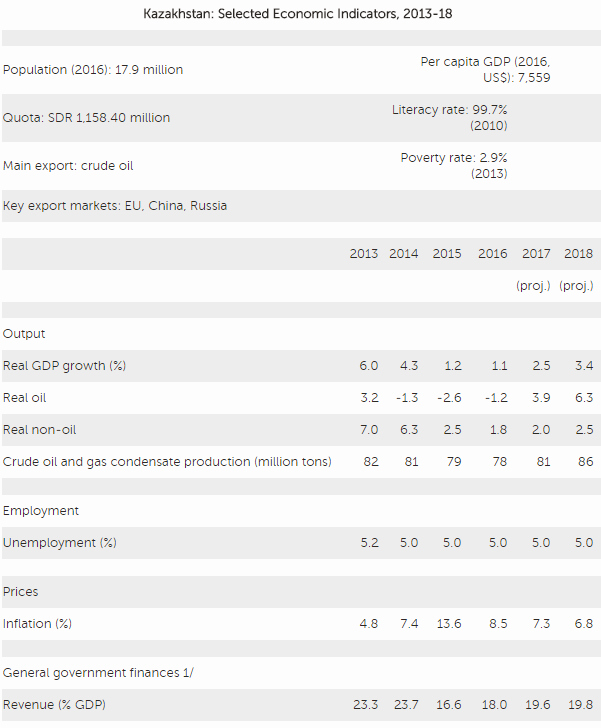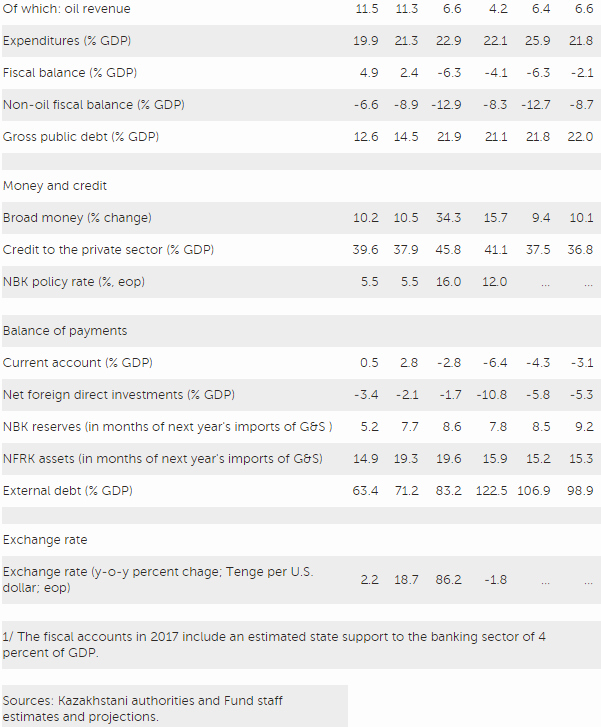IMF Executive Board Concludes 2017 Article IV Consultation with the Republic of Kazakhstan
On April 28, 2017, the Executive Board of the International Monetary Fund (IMF) concluded the 2017 Article IV consultation with the Republic of Kazakhstan.
After a slowdown in 2016, growth in Kazakhstan is expected to strengthen to 2.5 percent this year, reflecting higher oil production and the effect of substantial fiscal stimulus spending. The sharp exchange rate depreciation in late 2015-early 2016 triggered a surge in consumer prices, but inflation has come down to levels consistent with the National Bank of Kazakhstan’s target range. The medium-term outlook has improved, with growth in the non-oil sector of the economy expected to gradually pick up to 4 percent, benefitting from structural reforms and a resumption of bank lending. Uncertainty, however, is high, as the economy remains vulnerable to commodity price swings and especially to a sustained decline in oil prices.
Fiscal policy in recent years has been supportive of economic activity, mainly through the authorities’ flagship “Nurly Zhol” initiative, which has provided funding to infrastructure, SMEs, and housing. Such support will be reduced going forward, as the authorities move to consolidate. At the end of 2016, the authorities approved a new framework and rules for the National Fund that aim to sustain strong buffers and reduce the dependence of the budget on oil revenues. Also, in the context of transition to inflation targeting, the National Bank (NBK) has strengthened its policy toolkit and improved analytical capacity and communications. The decline in inflation, along with anchoring of expectations, has allowed for a steady reduction of the policy rate.
Notwithstanding progress made, important vulnerabilities remain to be addressed. In particular, problems in the banking sector have accumulated and need to be resolved promptly, as weak balance sheets generate uncertainty, affect credit and growth, and may create risks to public finances. Structural bottlenecks have hindered economic diversification, a prerequisite for achieving broad-based and inclusive growth.
Executive Board Assessment
Executive Directors commended the authorities’ policy response, which helped Kazakhstan weather the impact of lower oil prices and slower growth in key trading partners. However, Directors noted that growth prospects are constrained by vulnerabilities arising from swings in commodity prices and long-standing structural weaknesses. They emphasized that policy efforts ahead should focus on strengthening the macroeconomic frameworks, addressing financial sector issues, and implementing reforms to boost and diversify growth.
Directors agreed that while fiscal support helped during the slowdown, consolidation efforts are now needed to maintain strong buffers, reduce the non-oil deficit, protect intergenerational equity, and ensure long-term sustainability. They welcomed the new rules for the National Fund and underscored the importance of a strong fiscal framework to guide adjustment. Directors encouraged gradual unwinding of the fiscal stimulus to minimize its impact on growth. They agreed that the consolidation strategy should focus on increasing non-oil tax revenues to protect capital and social spending. Directors noted that the new tax code presents an opportunity to reduce distortions and raise revenues.
Directors supported the shift in monetary policy toward inflation targeting. They stressed that the National Bank of Kazakhstan (NBK) should continue to build credibility in the new regime, including maintaining exchange rate flexibility, which has been important in adjusting to the oil price shock. In addition, the NBK should further enhance its analytical capacity and communications. Directors advised the authorities to exercise caution against adopting a dual mandate for the NBK that explicitly targets growth. They noted that achieving low and stable inflation would be beneficial for growth through higher savings and investment.
Directors emphasized that addressing banking sector weaknesses, particularly high
non-performing loans, should be a top priority. While recognizing that state support is needed, they noted that the use of public funds should be subject to strict conditions to limit costs and moral hazard. A forward-looking, independent asset quality review is essential for assessing the conditions in the sector and estimating potential recapitalization needs. Directors encouraged steps to further strengthen bank supervision and regulation frameworks to ensure that problems do not reoccur. Implementing the FSAP recommendations will be helpful in this regard.
Directors welcomed the authorities’ ambitious structural reforms agenda and underscored that implementation is key. They noted that to diversify the economy away from oil and promote private sector development, it is important to improve the business environment, successfully complete the privatization program, and enhance the efficiency and accountability of public administration. Directors encouraged further improvements of the AML/CFT framework to ensure the integrity of the financial sector.


Source: International Monetary Fund
- 293 reads
Human Rights
Fostering a More Humane World: The 28th Eurasian Economic Summi

Conscience, Hope, and Action: Keys to Global Peace and Sustainability

Ringing FOWPAL’s Peace Bell for the World:Nobel Peace Prize Laureates’ Visions and Actions

Protecting the World’s Cultural Diversity for a Sustainable Future

Puppet Show I International Friendship Day 2020

